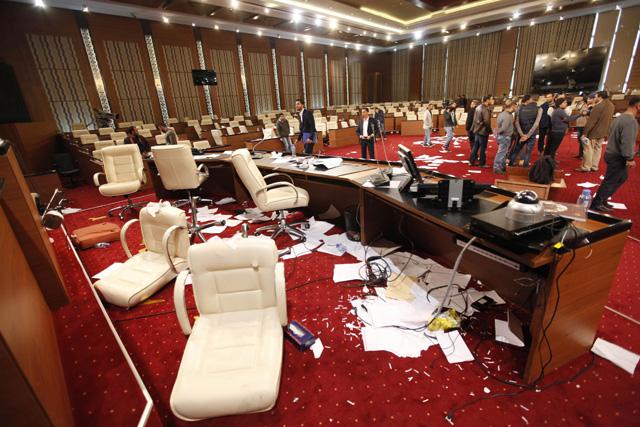You are here
Libya vows to stay on democratic path after parliament attack
By AFP - Mar 03,2014 - Last updated at Mar 03,2014

TRIPOLI — Libyan authorities vowed Monday to pursue a democratic transition in the face of mounting lawlessness after two MPs were shot when protesters stormed the country’s transitional parliament.
On Sunday, two members of the General National Congress (GNC) were shot and wounded as armed protesters stormed their building in Tripoli. In a separate incident, a French engineer was killed in the restive eastern city of Benghazi.
“I assure you we are committed to the path of the February 17 revolution and to pursue the democratic process,” GNC President Nuri Abu Sahmein said in a televised address, referring to the uprising that ended Muammar Qadhafi’s four-decade rule.
Abu Sahmein said the MPs’ wounds were not life-threatening but condemned what he termed a “flagrant aggression on the seat of legitimate sovereignty”.
He urged former rebel fighters who ousted Qadhafi to protect the capital and state institutions.
On Monday, ex-rebels equipped with pick-up trucks mounted with anti-aircraft guns were posted around the GNC building, where at least five burnt-out cars testified to the previous day’s violence.
Abu Sahmein said the GNC was examining a roadmap for the handover of power “as quickly as possible” to an elected body.
The GNC, elected after the 2011 uprising, has stirred popular anger by extending its mandate from early February until the end of December.
Under pressure from demonstrators, the GNC, Libya’s highest political authority, has announced early elections will be held but has not yet set a date.
The head of an elected panel tasked with preparing elections, Nuri Al Abbar, submitted his resignation to the GNC on Sunday, saying Libya had to “end political tensions and restore order” before holding polls.
He added that it would take another four or five months of preparations before elections could go ahead.
Libya’s political class is deeply divided, and GNC members are still demanding the resignation of Prime Minister Ali Zeidan, although they have failed to oust him in a vote of confidence.
Dozens of armed demonstrators on Sunday demanded the GNC be dissolved and railed against the “kidnapping” the previous night of participants in a sit-in protest outside the parliament building.
They later attacked and “abused” deputies, GNC spokesman Omar Hmidan said, adding that their cars had been destroyed.
One GNC member told AFP that the protesters, mostly young people armed with knives and sticks, entered the premises chanting “Resign, resign”.
Two members were “hit by bullets when they tried to leave the venue in their cars,” according to Abu Sahmein.
Ministers to Benghazi
In Benghazi, meanwhile, gunmen on Sunday shot dead a French engineer who worked for a company doing extensive work at a medical centre in the eastern city, which was the cradle of the 2011 revolt.
The government announced a six-member ministerial team was sent to Benghazi to examine ways to restore order in the city, the scene of almost daily attacks on security forces.
An assault on the US mission in Benghazi in 2012 killed the ambassador and three other Americans.
Three years after the uprising, the government and GNC have come under increasing criticism from Libyans who accuse them of corruption and failing to provide security.
Criminals roam the streets, and rival tribes shoot it out to settle long-standing disputes, while many ex-rebels have formed powerful militias rather than integrate into the regular armed forces and police.
A host of different factions and ex-rebel groups make up a dangerous cocktail which could send Libya sliding into civil war.
However, the proliferation of arms and militias left behind from the uprising have so far served as a balancing factor, deterring a power grab by any single group.
Adding economic misery to Libya’s woes, protesters have blockaded and shut down oil terminals, threatening to bankrupt a government that relies almost exclusively on petroleum revenues to operate.
Related Articles
Thousands of Libyans took to the streets Friday to protest against a decision by the interim parliament to extend its mandate, despite fears that lingering political instability could unleash fresh violence.
Libyan authorities stopped a North Korean-flagged tanker as it left a rebel-held port on Monday with an “illegal” shipment of crude, a military source said.
A new dispute is brewing in unrest-riddled Libya over a decision by its highest, but transitional, political authority to extend its mandate beyond February 7, with demonstrations called for this week.












